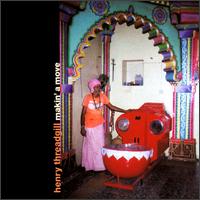
Henry Threadgill: Makin' A Move.

The HurdAudio celebration of Black History Month continues tonight with Makin' A Move from 1995 by Henry Threadgill.
This is another personal favorite for me. Henry Threadgill is a great jazz composer/orchestrator/arranger/performer with a penchant for working with unusual instrument combinations and Makin' A Move uses a number of rarely heard ensembles.
The opening track really catches my ear. "Noisy Flowers" is scored for piano (with my favorite pianist, Myra Melford), nylon string guitar, soprano guitar, steel string soprano guitar, steel string acoustic guitar and classical guitar. The guitars paint an other worldly landscape that gradually grows with intensity as the piano navigates through this odd sonic environment with bluesy effect. "Noisy Flowers" blurs the line between composition and improvisation as every second sounds as if it could be either. Melodic lines drift from one instrument to another as ideas fade in and out toward an arching crescendo. The texture itself drifts between chamber music and avant jazz without making any audible leaps between. The final sound rotates like an intricate, delicate mobile of glass playing with the fading light of a sunset. This track alone is reason enough to repeat this listening experience.
Programmed between these works of avant chamber jazz are compositions performed by Threadgill's band Very Very Circus. The instrumentation is alto saxophone (played by Threadgill himself), french horn, two electric guitars, two tubas and drums. The compositions for Very Very Circus are richly detailed, rhythmically propelled works. The sound of two tubas playing the bass line material really gives this rhythm section a sound all its own. There's also the added effect of having one tuba panned in each ear that allows me to parse how the low duties are split between the impressive talents of Edwin Rodriguez and Marcus Rojas (I'm actually familiar with Rojas work on other recordings, the man plays a seriously rockin' tuba).
"Refined Poverty" is scored for alto saxophone and three cellos. After presenting some melodic material on the horn the cellos quickly begin to build their murky, detailed texture. This continues the theme from "Noisy Flowers" of using a group of similar string instruments to paint a texture for the "odd instrument out" to navigate. "Refined Poverty" paints a sonic image in dark colors and overcast textures.
"The Mockingbird Sin" combines the multiple guitars from "Noisy Flowers" with the multiple cellos form "Refined Poverty" for a completely different kind of chamber string ensemble. "The Mockingbird Sin" builds upon its own logic as the instruments pass lines between each other as they fill out the frequency spectrum from cello to soprano guitar.
Threadgill's arrangements are dense. There's a lot going on that justifies his instrumentation choices as he takes full advantage of each instrument's range and timbral qualities. The performers on Makin' A Move do enormous justice to some intense, demanding compositions that grow and reach full bloom before one's ears. "Noisy Flowers" indeed.


No comments:
Post a Comment